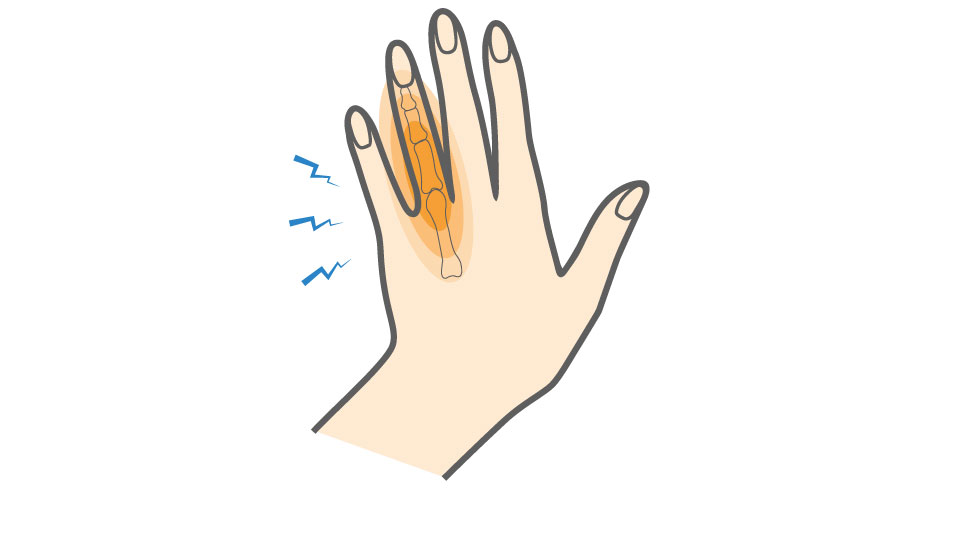Finger Sprain Causes, Symptoms & Treatment Options
A finger sprain occurs when the ligaments supporting the finger joints are stretched or torn, usually from a sudden impact or overextension. It causes pain, swelling, and stiffness, making it hard to move the finger. Most sprains heal with rest, ice, compression, and gentle rehabilitation exercises.
Start with our quick Symptom Assessment or connect directly with an Upswing Coach today.
Request an AppointmentReady to take the next step?
Start your symptom assessment or connect with a coach instantly.
Find Relief TodayOverview
Each finger contains three small bones called phalanges, except for the thumb, which has only two. These phalanges connect to the metacarpal bones of the hand, forming flexible joints that allow fine movement and grip.
Ligaments, the strong bands of connective tissue that hold these bones together, can sometimes stretch or tear due to sudden impact or excessive force. This condition is known as a finger sprain. It often occurs in sports or activities that involve catching, gripping, or sudden hand movements.
While finger sprains can be painful and limit motion, they are generally treatable with rest, ice, and proper care

What causes Finger Sprain?
Finger sprains occur when a strong physical force stretches or tears the ligaments supporting the finger joints. This can happen during a fall, a direct blow, or when the finger is forcefully bent backward. Most cases occur during sports or physical activity, but everyday accidents can also be responsible.
- How the Injury Occurs: A finger sprain usually happens when the finger is forced beyond its normal range of motion. This sudden stress overstretches the ligament, sometimes causing a partial or complete tear, leading to pain, swelling, and instability in the affected finger.
- Common Everyday Causes: Finger sprains can occur in everyday situations, such as jamming your finger in a door, lifting heavy boxes incorrectly, or slipping and landing on your hand.
Finger Sprains are Common in these sports:
- Basketball: Often caused when the ball strikes the tip of an extended finger while catching or blocking a pass.
- Baseball: Can occur when a ball hits the hand awkwardly while fielding or batting.
- Softball: Catching or diving plays can overextend the fingers, straining the ligaments.
- Gymnastics: Landing incorrectly after a routine or using hands for balance can cause ligament strain.
- Football: Common during tackling or catching passes when fingers are bent or jammed.
- Rugby: Direct collisions and ball handling can easily lead to ligament overstretching.
Symptoms
When a finger sprain occurs, athletes or active individuals often experience pain, stiffness, or discomfort in the affected finger joint. The injured area may feel sore and difficult to move. Other common signs include:
- Swelling: The injured joint may become visibly puffy or enlarged.
- Tenderness: The finger is sensitive to touch or pressure.
- Limited mobility: Difficulty bending or straightening the finger fully.
- Bruising: Discoloration may appear around the joint due to internal bleeding.
When to see a doctor
If you jam your finger and it doesn’t improve after three to four days, seeking medical attention is essential. Provide your doctor with details about how the injury happened and any sports or activities you participate in, as this helps in an accurate diagnosis.
During your visit, the doctor will check for swelling, tenderness, and range of motion by asking you to flex and extend your finger. They may also perform X-rays to rule out a fracture and confirm whether it’s a sprain or another hand injury. Early diagnosis and proper treatment can prevent long-term stiffness or instability in the joint.
Non-operative treatment
Finger sprains are common but heal well with simple, non-surgical treatment. Most people can recover fully with rest and proper care. Recommended treatments include:
- Applying ice: Helps reduce swelling and ease pain when used for 15–20 minutes several times daily.
- Keeping your finger elevated: Especially helpful at night to minimize swelling and promote circulation.
- Gentle finger movement: Gradually bend and straighten your finger to prevent stiffness once the pain subsides.
- Anti-inflammatory medication: Over-the-counter pain relievers like ibuprofen, naproxen, or aspirin can help manage discomfort and inflammation.
- Taping/Splinting: In more serious sprains, immobilizing or taping the finger to a neighboring finger supports healing and prevents further injury.
You can also perform simple range-of-motion and strengthening exercises at home once your doctor advises it’s safe.
Recovery
Most finger sprains heal completely within three to six weeks, depending on the severity of the ligament injury and how well treatment is followed. Recovery time can vary for athletes or individuals who use their hands frequently.
Occupational or physical therapy may be recommended to restore the injured finger’s strength, flexibility, and coordination. When returning to sports or physical activity, taping or splinting the finger can provide extra protection and help prevent re-injury. With consistent care and gradual return to motion, most people regain full function without long-term issues.
Dr. Jay Kimmel is a board-certified orthopedic surgeon specializing in sports medicine, arthroscopic surgery, and shoulder and knee disorders. He completed his orthopedic training at New York-Presbyterian/Columbia University Medical Center and a Sports Medicine Fellowship at Temple University.
Dr. Kimmel previously served as the Director of the Connecticut Sports Medicine Institute at Saint Francis Hospital and has held faculty appointments as Clinical Assistant Professor in the Departments of Orthopedics and Family Medicine at the University of Connecticut. He has extensive experience caring for athletes as a team physician for high school and collegiate programs and continues to teach in the athletic training departments at Westfield State University and Springfield College.
Find the Support You Need — Right When You Need It
Whether you’re managing pain for the first time, need ongoing guidance, or require expert medical care, we’re here to help you every step of the way.
ORTHO DIRECT
Video visit with an orthopedic doctor for advice and a care plan.
$30
/MonthMRI DIRECT
Fast, affordable MRI with orthopedic review. No insurance required.
$499
/MonthFrequently Asked Questions
How Long Does Healing Take?
- Mild sprain: Recovery may take up to 3 weeks.
- Severe sprain: Healing could extend to 6–8 weeks.
Your healthcare provider will determine when returning to daily activities or sports is safe.
How to Protect a Sprained Finger
Depending on the injury, various protective methods may be used:
- Finger wrap
- Aluminum splint
- Protective taping or buddy taping (pairing the injured finger with a neighboring one)
These measures help prevent further damage during recovery.
What If a Sprained Finger Is Left Untreated?
Ignoring a sprain can lead to:
- Chronic stiffness
- Ongoing pain
Prompt care ensures proper healing and prevents long-term complications.
What is the General Timeline for Sprain Recovery
Healing time varies based on the injury's severity and location:
- Minor sprains: A few days to a 3 weeks
- Moderate to severe sprains: Several weeks to months

